| Srl | Item |
| 1 |
ID:
132908


|
|
|
|
|
| Publication |
2014.
|
| Summary/Abstract |
Promotion of renewable energy and application of clean technology are essential for limiting emissions of GHG and facilitating environmentally compatible development. Although India and the European Union (EU) recognise their vulnerability to climate change, they differ on their 'normative claims' of the global climate change regime. India and the EU do not agree on emission cut targets. They can cooperate in multiple ways in the areas of clean technologies, renewable energy, research and development and sharing knowledge for sustainable development planning, etc. India has adopted a comprehensive National Action Plan on Climate Change (NAPCC), which comprises of both mitigation and adaptation measures to climate change. The implementation of the NPACC would be crucial in shaping a policy for inclusive and sustainable development. Hence, cooperation between India and the EU can take place in areas of the NAPCC that would help not only in coping with climate change, but also in enhancing India's economic relations as well as development partnership with the EU.
|
|
|
|
|
|
|
|
|
|
|
|
|
|
|
|
| 2 |
ID:
154049
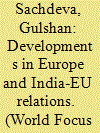

|
|
|
|
|
| Summary/Abstract |
In the last few years, Europe is facing many challenges. These include difficulties in managing a single currency mechanism, influx of refugees, crisis in Ukraine, terrorist attacks, rise of populism and British exit from the European Union (EU). Despite these difficulties, the EU is still a major economy with huge capacities to influence issues concerning global governance. As a major trade and investment partner of India, developments in Europe have significant implications for the Indian economy and India-EU ties. After a few years of sluggishness, India-EU strategic partnership is again gaining momentum with an agreed Agenda for Action 2020. As negotiations on bilateral trade and investment agreement may take time, both India and the EU are focusing on other areas where increased consultations can lead to concrete outcomes. The areas include climate change, energy, environment, counter-terrorism, maritime security, science and technology, development cooperation, migration and mobility, civil society linkages and dialogues on Asia and Africa.
|
|
|
|
|
|
|
|
|
|
|
|
|
|
|
|
| 3 |
ID:
118085
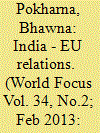

|
|
|
| 4 |
ID:
145005
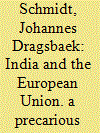

|
|
|
|
|
| Summary/Abstract |
The introduction of the “strategic partnership” between India and the EU in 2004 was an attempt to gradually deepen and institutionalize diplomatic relations and cooperation between the two entities within a number of areas such as multilateralism, security and human rights, enhancement of commercial and economic exchanges, sustainable development, climate change and poverty, and promotion of interactions at the civil society level. A joint action plan was later signed, but the relationship has not yet evolved into a strategic level between two equal partners. Seen from both sides, there are inadequacies and inconsistencies in the way the partnership is being conducted. There are serious complaints especially from India’s perspective about the dialogue itself and a lack of deep and serious commitment to move beyond the obvious and in some cases what is described a patronizing tone from EU delegations. This paper gives an overview of recent developments in the relationship with an emphasis on the period since the beginning of the European sovereign debt crisis and the simultaneous global shift away from geo-economics towards geo-politics. It utilizes a critical international political perspective which gives a coherent understanding of the interaction between what looks like a “normal” trade and investment relationship but what in reality appears as mercantilism mixed up with history, culture and politics. Adding to these difficulties are a number of domestic constraints which complicate the relationship.
|
|
|
|
|
|
|
|
|
|
|
|
|
|
|
|
| 5 |
ID:
116046
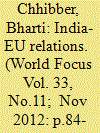

|
|
|
| 6 |
ID:
118083
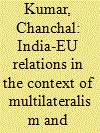

|
|
|
| 7 |
ID:
128121
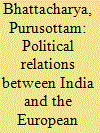

|
|
|
|
|
| Publication |
2013.
|
| Summary/Abstract |
The development of India's relations with the European Union (EU) has been a slow and graduate affair over the past five decades. India's linkages with the mainland continental Europe in the wake of its independence in 1947 were somewhat tardy in developing as the region was accorded a relatively lower priority by decision makers, in New Delhi. The only exception was Britain with whom India has deep ties for historical reasons and which New Delhi decided to continue even after independence on political and economic grounds.
|
|
|
|
|
|
|
|
|
|
|
|
|
|
|
|